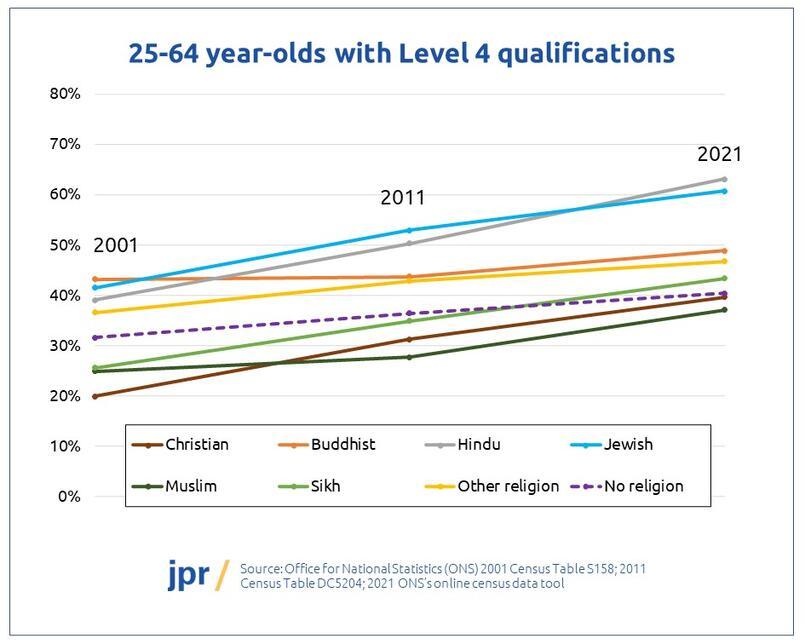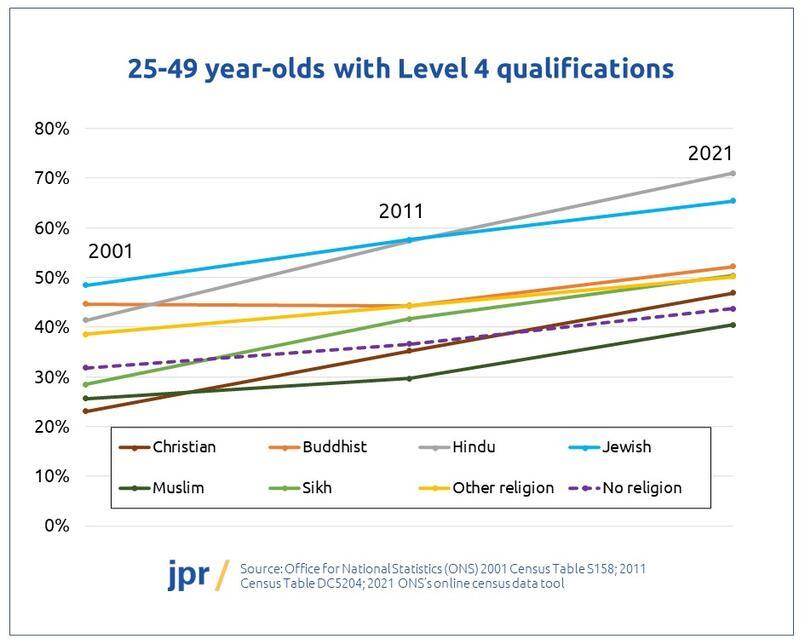The latest data from the 2021 UK Census show that Jews no longer lead the table of higher education achievers, even though the percentage of Jews achieving higher degrees continues to rise
Dr David Graham
Dr David Graham
”My son the doctor;” “my daughter the lawyer” – the stereotypical Jewish mother has long focused on her children’s professional achievements, and taken pride in their educational attainment. And data from numerous sources have shown for many years that Jews are often close to, or at the top of educational achievement statistics, including in the most recent Census of England and Wales, from 2021. However, their position has slipped in relative terms, especially during the decade from 2011-2021. And while this is not a competition, that shifting positionality tells a story about the place of the Jewish community in British society: in 2021, Jews no longer held the educational qualifications crown.
When completing the Census form in 2021, all respondents were asked about the educational qualifications they had gained. As in the previous two censuses in 2011 and 2001, this information can be analysed by religious group, allowing researchers to examine how educational achievement has changed among Jews and all other major religious communities over the past twenty years. The assessment focuses on the highest qualification achieved, which, in Office for National Statistics (ONS) jargon, is called ‘Level 4’.* This broad measure includes degree, higher degree and professional qualifications such as teaching and nursing diplomas.
It is important to note that educational achievement is sensitive to a person’s age. First, it takes time to climb the educational ladder, so for this analysis I focus on those who are at least 25 years old, as people younger than that are much more likely to be still gaining higher-level qualifications. Second, higher education has expanded tremendously since the 1980s, meaning that older people, especially those now retired, may not have had the same opportunities as younger people to achieve these higher-level qualifications when they were younger.
Selecting people who are old enough to have had time to achieve a Level 4 qualification but who are still young enough for such an opportunity to be available to most of them, i.e. those aged 25-64 in 2021, indicates that Jews in England and Wales score very well. 61% of British Jews in that age band recorded a higher-level qualification, second only to Hindus at 63%. Both groups are well ahead of the next group, Buddhists, at 49%.
When examining the results over the last ten years, all groups climbed, with the most substantial growth among Muslims, although they remain the group least likely to have higher qualifications. Over the longer 2001-2021 period, the strongest growth was among Christians.

While the overall picture is important, younger adults have had the most opportunities to attain higher education credentials. When limiting the data to those aged 25-49, we see a similar picture, but in these younger cohorts, it is even more evident that the Hindu group has raced ahead of everyone else, including Jews. An astonishing 71% of Hindus aged 25-49 have achieved higher educational qualifications, compared with 65% of Jews in the same age band. In 2001, Jews were seven percentage points ahead of Hindus. Twenty years later, in 2021, Jews were six percentage points behind.

We should not underestimate the rising levels of Hindus achieving a higher degree. In 2001, it would have been hard to predict how high the Hindu group would climb over the following twenty years, but by 2021 they were top of the list. The fact that, for the first time, one of their adherents is now the British Prime Minister is surely no coincidence but a testament to their hard-earned place in British society.
Cultural attitudes among Jews about the importance of higher education are certainly a fundamental explanation for the strong figures exhibited by Jews historically. And this is an explanation for the educational rise of Hindus too. Other South-East Asian groups, whilst also rising, have not increased nearly as strongly as Hindus, despite similar migratory stories.
But another factor impacting the data on Jews is the rise of the Strictly Orthodox component of the Jewish population. Strictly Orthodox Jews tend to emphasise advanced religious studies, not recognised in the census data, over secular and professional qualifications. We can measure this impact on the overall picture by isolating local authorities whose Jewish populations are predominantly strictly Orthodox (i.e. Castle Point, Gateshead, Hackney, Haringey, and Salford) to reveal not only that Strictly Orthodox Jews are about half as likely as the remaining ‘mainstream’ Jews to have achieved higher level qualifications (35% v 71% in the 25-49 age group), but also that, despite having closed the gap, Hindus at 71% have not quite overtaken mainstream Jews. At least not yet.
* Level 4 qualifications include: degree (BA, BSc), higher degree (MA, PhD, PGCE), NVQ level 4 to 5, HNC, HND, RSA Higher Diploma, BTEC Higher level, professional qualifications (for example, teaching, nursing, accountancy)
Senior Research Fellow
Senior Research Fellow
David is a Senior Research Fellow at JPR, an Honorary Associate at the Department of Hebrew, Biblical and Jewish Studies at the University of Sydney...
Read more